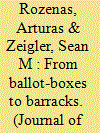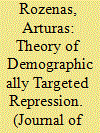| Srl | Item |
| 1 |
ID:
165447


|
|
|
|
|
| Summary/Abstract |
The military often intervenes in politics shortly after elections. This might be because election results reveal information about the ease with which a coup can succeed. Would-be coup perpetrators use this information to infer whether the incumbent can be removed from office without provoking popular unrest. We argue that the informational content of elections depends on the electoral rules that translate votes into outcomes. In electoral systems that incentivize strategic voting, election returns are less informative about the distribution of political support than in electoral systems that incentivize sincere voting. An extensive battery of statistical tests shows that vote-shares of election winners do not predict coup attempts in plurality systems, which encourage strategic voting, but they do predict coup attempts in non-plurality electoral systems, which do not encourage strategic voting. Thus, incumbents who have performed well in elections face a lower risk of coup attempts, but only in institutional environments where voting results are highly informative about the distribution of political support. We apply this logic to illuminate the decisions of the military to intervene into politics during the famous failed 1936 coup in Spain and the successful 1973 coup in Chile.
|
|
|
|
|
|
|
|
|
|
|
|
|
|
|
|
| 2 |
ID:
165428


|
|
|
|
|
| Summary/Abstract |
States use repression to enforce obedience, but repression—especially if it is violent, massive, and indiscriminate—often incites opposition. Why does repression have such disparate effects? We address this question by studying the political legacy of Stalin’s coercive agricultural policy and collective punishment campaign in Ukraine, which led to the death by starvation of over three million people in 1932–34. Using rich micro-level data on eight decades of local political behavior, we find that communities exposed to Stalin’s “terror by hunger” behaved more loyally toward Moscow when the regime could credibly threaten retribution in response to opposition. In times when this threat of retribution abated, the famine-ridden communities showed more opposition to Moscow, both short- and long-term. Thus, repression can both deter and inflame opposition, depending on the political opportunity structure in which post-repression behavior unfolds.
|
|
|
|
|
|
|
|
|
|
|
|
|
|
|
|
| 3 |
ID:
173131


|
|
|
|
|
| Summary/Abstract |
People from specific ethnic, religious, or other externally identifiable groups are often subjected to harsher repression than others. This phenomenon of demographically targeted repression is often viewed as a result of xenophobia. I provide a rationalist explanation of demographic targeting to understand why this form of repression is employed even without xenophobic motives. Building on the empirical literature, I model an environment where a threat of repression may motivate people to oppose the regime defensively. I show that, in such conditions, the regime may use demographic targeting to undermine cross-group collective action. The model explains when demographic targeting is used and how it shapes the behavior and identity of citizens. I use the model to make sense of certain aspects of repression policy in China
|
|
|
|
|
|
|
|
|
|
|
|
|
|
|
|